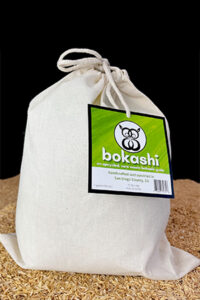
good Grow Bokashi
Whether you’re looking to manage the bad smells of your food waste, speed up your existing composting methods or start your composting journey with a simple method, we are here to help you get started with our handcrafted, upcycled bokashi.

HOW TO BOKASHI
Step #1
Put food waste in air tight bucket (including meat, fats, rotten food). The best size bucket for this process is 5 gallons. Ensure lid is tight between additions.
Step #2
Sprinkle ~1/4 cup bokashi per 1/4 bucket.
Step #3
Once full, ensure the lid is tightly closed and wait 2 weeks.
Step #4
Bury contents in the ground.
Step #5
Wait 2 more weeks for composted food waste.
FAQ's
Below are a few of our most frequently asked questions...
Good Grow’s bokashi is inoculated with Lactobacillus, which will essentially ferment your food waste in an anaerobic environment. Because the food waste is fermented, it will halt the rotting process. This process is similar to pickles and kimchi! Once your food waste is inoculated, it can be buried. This process also helps speed up the breakdown process for quicker, less manual composting.”
The most common ways are for composting or as a soil amendment.
Yes! Bokashi simplifies the composting process
No, but doing so can help speed up the composting process
No! We like to keep things simple and find the fluid in the bucket and food waste is beneficial for the overall composting process.
Yes, as long as you have an airtight seal.
Yes! Unlike with traditional composting, you can compost almost any food waste!
Some customers have had success with this but Good Grown Organics hasn’t explored this extensively.


